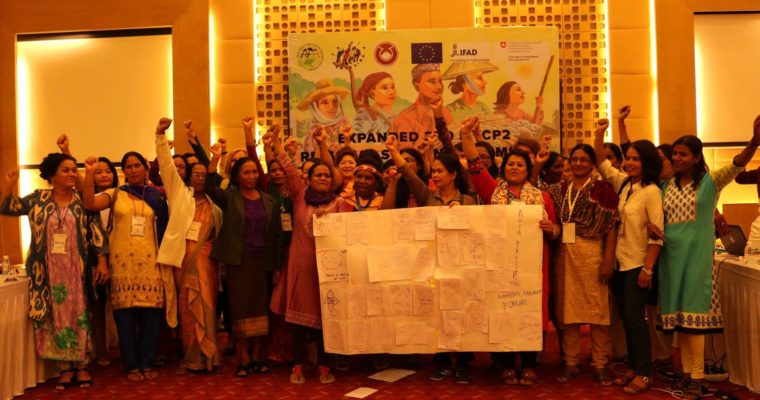We are women farmer leaders from 13 countries gathered here for the Asia Pacific Women Farmers Forum, held October 4-6, 2017 in Ahmedabad, Gujarat, India. Here we discussed about the initiatives we take to reduce poverty and hunger in our families and communities, the challenges and obstacles we face as we perform our roles in society development and the strategies and actions we want to implement to fully achieve our potentials as key stakeholders in sustainable development.
We women farmers are the backbone of the rural economy are living examples of the nexus between agriculture, food, health and nutrition, water and sanitation, as well as energy, as the interconnections show in the work we do. We plant trees, vegetables, fruits and raise animals for our food and our livestock’s fodder. We bring our products to the market. We fetch water, gather firewood, cook food, clean our homes and surroundings, take care of the health of the family . We are the first teachers, the first doctors, the first nurse, and from our wombs we give birth to new babies. Meeting our needs and responding to the challenges we face is therefore a development imperative.
Through our organizations, we have taken efforts to reduce hunger and poverty in our communities and to cool the planet, transforming our farms from mono culture to integrated, diversified organic farms, directly selling our sustainably-grown produce to local markets and in many cases adding value to our products and bringing them to bigger traders and even directly to consumers, building the capacities of women leaders to be master trainors and provide extension services to women farmers from the village level . We have engaged our governments in enacting policies that will reduce inequalities of women in the farms, such as joint titling of lands and meaningful involvement in water management.
And yet our work and contributions is still underrecognized, undervalued, underpaid. We are most vulnerable during natural disasters. Our voices are seldom heard at community, national and global levels. Opportunities to uplift our conditions are inadequate to respond to the gross inequalities that we face. Without proper incentives and opportunities, without an enabling environment, our contributions to reducing hunger and poverty in the world will not be unleashed in the scale of millions.
That is why we are asking our Governments to provide an enabling and favorable environment to strengthen our contributions to sustainable development:
- ensure women’s rights to lands, waters, forests and seeds
- provide incentives and support for integrated, diversified organic farming and promotion of home gardens and climate resilient agriculture
- provide incentives and support for cooperatives and enterprises that are managed and owned by women farmers such as loans, credit at subsidized rates
- ensure that global trade policies and agreements do not undermine the livelihoods of women farmers
- Ensure the meaningful involvement of women farmers in agriculture
- Provide IT related support so they can get information on market, weather, technologies and other programs
- Recognize women farmers through identity cards
- Provide the necessary social and physical infrastructures (e.g. roads, bridges, market buildings, storage facilities, health centers, training facilities, land for demonstration farms, etc.)
We are asking our development partners to support the following :
- Dedicate and allocate a reasonable amount for farmer’s organizations (e.g. revolving fund, grants, concessional loans, etc.)
- building our leadership and management capacities to run our own women’s spaces and /or lead alongside with our male counterparts in farmers organizations
- strengthen solidarity and knowledge sharing and capturing lessons learned from our initiatives through various exchange visits, study tours, and production and dissemination of knowledge materials and use of social media
- support the formation and strengthening of women’s involvement in enterprises and farmers cooperatives that add value to our priority products
- provide project guidelines that underline affirmative action for women in project design , implementation, monitoring and evaluation
- Provide farmer-friendly project reporting formats
We will endeavor to do the following in our organizations at the country , sub regional and regional level :
- have affirmative action in our organizations ( 50% women participation in mixed farmer organizations) leading to formation of women’s wings and committees while continuing the discourse
- build leadership capacities of our women members so they can manage their projects and enterprises
- sensitize both men and women on gender dynamics and advocate for gender equality at home and in the workplace
- organize and consolidate our membership to have a strong and legitimate voice in governance and advocacy processes
- strengthen our efforts in promoting nutrition sensitive and climate resilient agriculture
As an expression of commitment to reducing hunger and poverty and to sustainable development, we have made a collage of the small but sure steps that we can do to make this plan come true.




Comments are closed